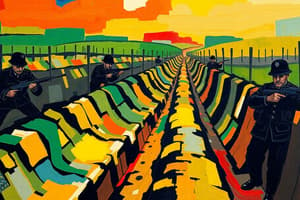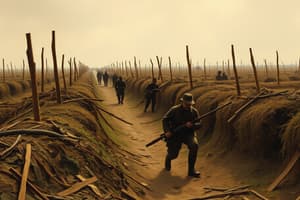Podcast
Questions and Answers
What was a common term used historically for the mental strain experienced by soldiers?
What was a common term used historically for the mental strain experienced by soldiers?
- Battle Fatigue
- Combat Stress
- Shell Shock (correct)
- War Weariness
Recruitment posters during World War I were predominantly designed to discourage men from enlisting.
Recruitment posters during World War I were predominantly designed to discourage men from enlisting.
False (B)
Name one reason men enlisted to go to war.
Name one reason men enlisted to go to war.
Patriotism
The Industrial Revolution introduced advanced weaponry, such as ______, which transformed warfare.
The Industrial Revolution introduced advanced weaponry, such as ______, which transformed warfare.
Match the following innovations of warfare with their descriptions:
Match the following innovations of warfare with their descriptions:
What was a significant short-term cause of World War I?
What was a significant short-term cause of World War I?
Australia entered World War I by declaring support for France.
Australia entered World War I by declaring support for France.
What type of warfare became characteristic of World War I?
What type of warfare became characteristic of World War I?
The campaign at Gallipoli aimed to weaken the ________ Empire.
The campaign at Gallipoli aimed to weaken the ________ Empire.
Match the following terms with their descriptions:
Match the following terms with their descriptions:
Which of the following technology advancements was NOT used during World War I?
Which of the following technology advancements was NOT used during World War I?
Trench warfare during World War I typically resulted in fast-paced movements and quick wins.
Trench warfare during World War I typically resulted in fast-paced movements and quick wins.
What were the conditions like for soldiers in the trenches?
What were the conditions like for soldiers in the trenches?
Flashcards
Short-term cause of WWI
Short-term cause of WWI
The assassination of Archduke Franz Ferdinand and rising tensions between European powers.
Long-term cause of WWI
Long-term cause of WWI
Militarism, alliances, imperialism, and nationalism.
Australian response to WWI
Australian response to WWI
Australia declared support for Britain and automatically entered the war in 1914.
Trench warfare
Trench warfare
Signup and view all the flashcards
Modern industrialized warfare
Modern industrialized warfare
Signup and view all the flashcards
Gallipoli Campaign
Gallipoli Campaign
Signup and view all the flashcards
Life in the trenches
Life in the trenches
Signup and view all the flashcards
ANZAC troops
ANZAC troops
Signup and view all the flashcards
World War I Soldier Experiences
World War I Soldier Experiences
Signup and view all the flashcards
Industrial Revolution Impact on Warfare
Industrial Revolution Impact on Warfare
Signup and view all the flashcards
Soldier Motivation
Soldier Motivation
Signup and view all the flashcards
Recruitment Posters in WWI
Recruitment Posters in WWI
Signup and view all the flashcards
Shell Shock in WWI
Shell Shock in WWI
Signup and view all the flashcards
Study Notes
Short-Term Causes of World War 1
- Assassination of Archduke Franz Ferdinand
- Rising tensions between European powers
Long-Term Causes of World War 1
- Militarism
- Alliances
- Imperialism
- Nationalism
- Competition for power, resources, and influence created a volatile environment.
Australia's Response to World War 1
- Declared support for Britain, automatically entering the war in 1914
- Thousands volunteered for the Australian Imperial Force (AIF)
- Contributed significantly to campaigns like Gallipoli and the Western Front
- Involvement shaped Australia's national identity.
Nature of Warfare in World War 1
- Shift to modern, industrialized warfare
- Characterized by trench warfare – soldiers fought from entrenched positions
Trench Warfare
- Soldiers fought from fortified ditches, leading to stalemates
- Harsh conditions: mud, rats, disease, and constant threat of attacks
- Goal: strategic territory gains, but led to high casualties and long suffering
Gallipoli Campaign
- Allied attempt to capture the Dardanelles Strait, weakening the Ottoman Empire
- Faced strong Turkish resistance
- Heavy Allied casualties
- Withdrawal without achieving objectives
- Symbolic of bravery and sacrifice for Australia and New Zealand
Life in the Trenches
- Constant threats: enemy fire, artillery bombardments, snipers
- Overcrowded, muddy trenches
- Infested with rats, lice, and diseases like dysentery
- Limited food, extreme weather, boredom punctuated by violent combat
- "Shell shock" (PTSD) widespread
- Strong bonds of camaraderie and resilience were formed
Industrial Revolution's Impact on Warfare
- Advanced weaponry (machine guns, artillery)
- New technologies (tanks, airplanes)
- Mass production for quick equipment and improved logistics
- Increased deadliness, mechanized warfare, and larger scale
Reasons for Enlistment
- Patriotism, duty to country, societal pressure
- Adventure, camaraderie, steady income
- Nationalistic pride, propaganda, defense of home
- Peer pressure, sense of adventure, and a feeling of duty
Recruitment Posters
- Used to encourage men to enlist
- Patriotic messages, powerful imagery (appealing to duty/pride)
- Displayed in public spaces
- Persuasive or shaming tactics used to increase enlistment
Studying That Suits You
Use AI to generate personalized quizzes and flashcards to suit your learning preferences.




